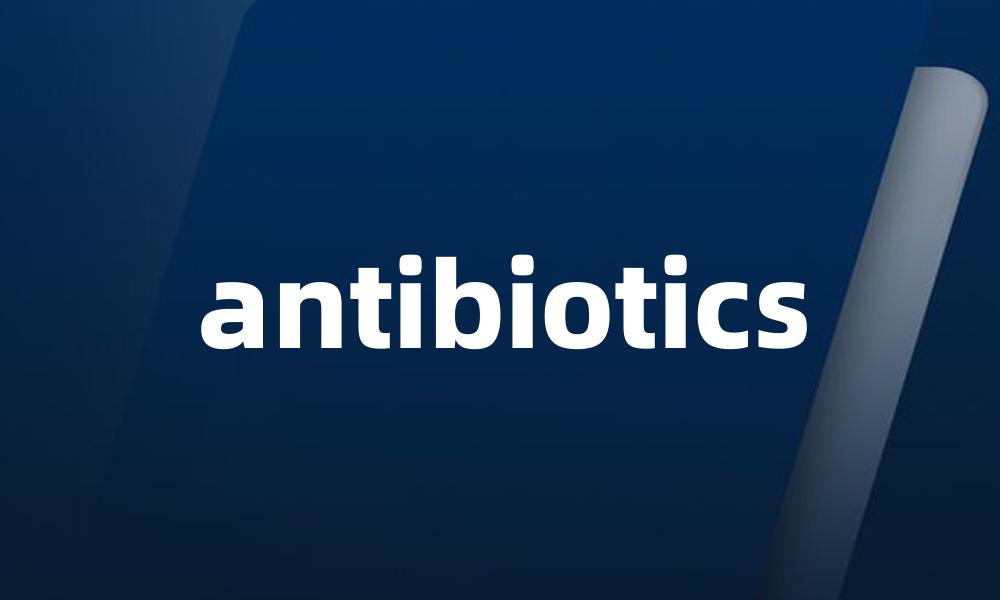
antibiotics
形容词 (Adjective)
1. 抗生的 - 英文释义:relating to or derived from living organisms (such as bacteria) and able to inhibit or kill other microorganisms - 例句: 1. Antibiotics are commonly used to treat bacterial infections. (抗生素常用于治疗细菌感染。) 2. This cream contains antibiotics that can help prevent infection. (这种乳膏中含有能防止感染的抗生素。)名词 (Noun)
1. 抗生素 - 英文释义:a drug that is used to kill harmful bacteria and cure infections - 例句: 1. The doctor prescribed antibiotics to treat the patient's sinus infection. (医生开了抗生素来治疗患者的鼻窦炎。) 2. It is important to finish the full course of antibiotics as prescribed by the doctor. (按照医生的处方完成完整的抗生素疗程是很重要的。)词语辨析
抗生素 (antibiotics) 和抗菌药 (antimicrobial) 都用来指能够抑制或杀灭细菌等微生物的药物,但抗生素更常用于指治疗细菌感染的药物,而抗菌药则更广泛地包括了抗生素以外的抗病毒、抗真菌等药物。词汇扩充
- 抗菌药物 (antimicrobial) - 细菌感染 (bacterial infection) - 抗生素耐药性 (antibiotic resistance) - 细菌抗性 (bacterial resistance) - 抗生素疗程 (course of antibiotics)近义词
- 抗菌剂 (antimicrobial agent) - 杀菌剂 (germicide) - 消毒剂 (disinfectant) - 抗菌素 (antibacterial)反义词
- 抗生素敏感 (antibiotic-sensitive) - 非抗生素 (non-antibiotic)柯林斯词典(Collins Dictionary)
名词: 1. Antibiotics are medical drugs used to kill bacteria and treat infections. 2. Antibiotics are substances that can destroy some types of bacteria. 3. Antibiotics are substances that are produced naturally by bacteria and fungi and are able to kill other bacteria, fungi, or control their growth.牛津词典(Oxford Dictionary)
名词: 1. A medicine (such as penicillin or its derivatives) that inhibits the growth of or destroys microorganisms. 2. A substance produced by or derived from certain fungi, bacteria, and other organisms, that can destroy or inhibit the growth of other microorganisms.用法
1. 搭配动词: - take antibiotics (服用抗生素) - prescribe antibiotics (开抗生素处方) - administer antibiotics (给予抗生素) - develop resistance to antibiotics (对抗生素产生耐药性) - treat with antibiotics (用抗生素治疗) 2. 抗生素的使用范围: - antibiotics for bacterial infections (治疗细菌感染的抗生素) - broad-spectrum antibiotics (广谱抗生素) - topical antibiotics (局部抗生素) - oral antibiotics (口服抗生素) - intravenous antibiotics (静脉注射抗生素)例句
- Antibiotics are commonly used to treat bacterial infections. (抗生素常用于治疗细菌感染。)
- This cream contains antibiotics that can help prevent infection. (这种乳膏中含有能防止感染的抗生素。)
- The doctor prescribed antibiotics to treat the patient's sinus infection. (医生开了抗生素来治疗患者的鼻窦炎。)
- It is important to finish the full course of antibiotics as prescribed by the doctor. (按照医生的处方完成完整的抗生素疗程是很重要的。)
- Antibiotics are not effective against viral infections. (抗生素对病毒感染无效。)
- Overuse of antibiotics can lead to antibiotic resistance. (滥用抗生素会导致抗生素耐药性。)
- The patient developed an allergic reaction to the antibiotics. (患者对抗生素产生了过敏反应。)
- Some bacteria have become resistant to certain antibiotics. (一些细菌对某些抗生素产生了抗药性。)
- She was treated with a combination of antibiotics. (她接受了联合抗生素治疗。)
- The doctor decided to switch to a different antibiotic. (医生决定更换另一种抗生素。)
- It is important to take antibiotics exactly as prescribed by the doctor. (按照医生的处方准确地服用抗生素是很重要的。)
- The use of antibiotics in livestock farming is a concerning issue. (家畜养殖中使用抗生素是一个令人担忧的问题。)
- She was advised to avoid alcohol while taking antibiotics. (医生建议她在服用抗生素期间避免饮酒。)
- Antibiotics are not effective against fungal infections. (抗生素对真菌感染无效。)
- Long-term use of antibiotics can disrupt the natural balance of gut bacteria. (长期使用抗生素会破坏肠道细菌的自然平衡。)
- Some antibiotics may cause side effects such as nausea and diarrhea. (一些抗生素可能会引起恶心和腹泻等副作用。)
- He was given a high dose of antibiotics to fight the severe infection. (为了对抗严重感染,他被给予了高剂量的抗生素。)
- Antibiotics can be life-saving in certain medical situations. (在某些医疗情况下,抗生素可以挽救生命。)
- It is important to complete the full course of antibiotics, even if symptoms improve. (即使症状好转,也要完成完整的抗生素疗程,这一点很重要。)
- Antibiotics should not be used as a preventive measure for viral infections. (抗生素不应用于预防病毒感染。)
- Antibiotics are crucial in the treatment of severe respiratory infections. (在治疗严重呼吸道感染中,抗生素至关重要。)

 小皮
小皮